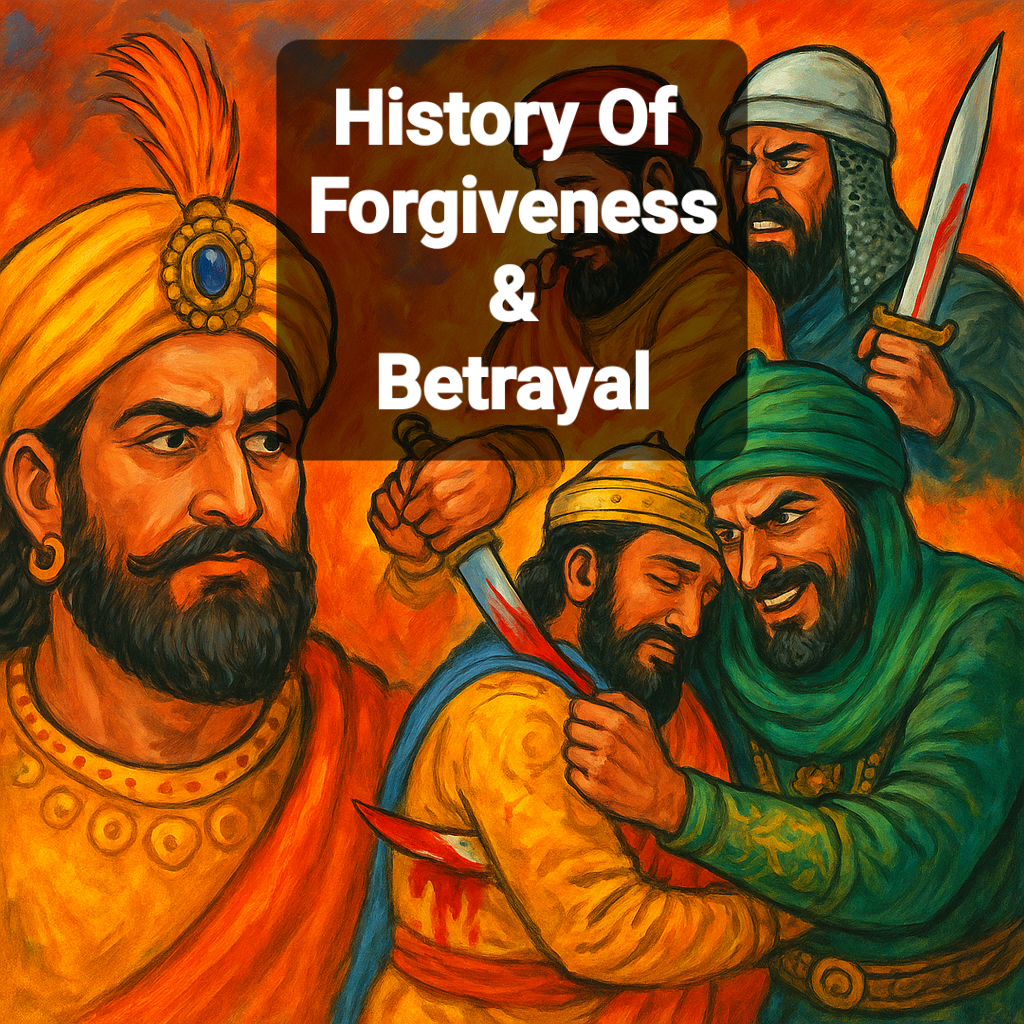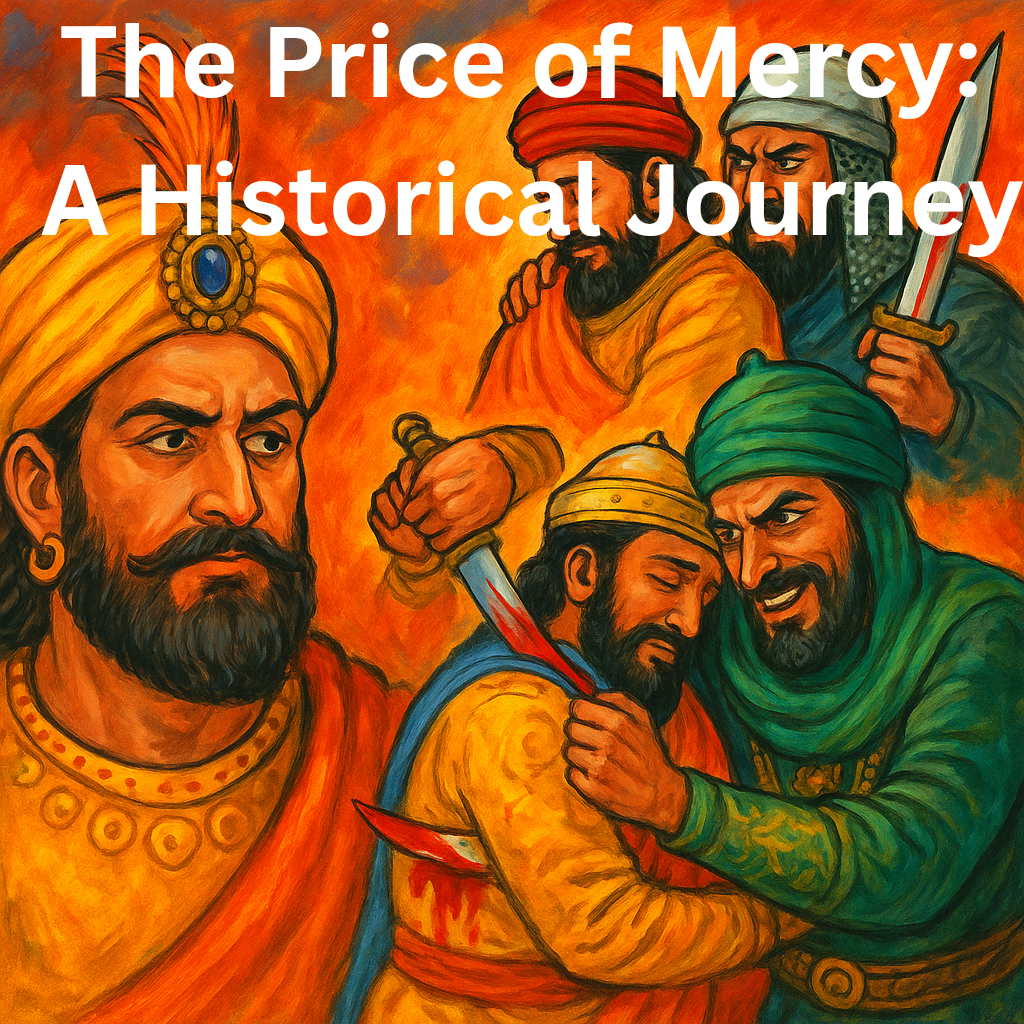When Bharat Forgave, India Was Betrayed. Never Again.
By Madhurie Singh, May 22, 2025

The Price of Mercy: A Historical Journey Through Hindu Forgiveness and Betrayal

They Forgave. They Were Betrayed.
This is not just a story of war and politics—it’s a haunting pattern that has repeated itself over a thousand years. From ancient emperors like Prithviraj Chauhan to modern leaders like Vajpayee and Modi, history shows us that the path of forgiveness has often ended with bloodshed, treachery, or territorial loss. This post brings together a chilling timeline of betrayals that followed Hindu acts of mercy—from the battlefield to the diplomatic table.
1. Prithviraj Chauhan and Muhammad Ghori (1191–1192 CE)
In the First Battle of Tarain in 1191, Prithviraj Chauhan defeated and captured Muhammad Ghori. However, instead of executing him, Prithviraj spared his life and allowed him to return to Ghazni.
This act of forgiveness proved costly. Ghori returned the following year with a larger force, defeated Prithviraj in the Second Battle of Tarain, captured him, and allegedly tortured and executed him. This loss marked the beginning of centuries of Islamic rule in North India.
2. Raja Dahir and Muhammad bin Qasim (712 CE)
Raja Dahir, the Hindu king of Sindh, resisted the Arab invaders led by Muhammad bin Qasim. Dahir had given shelter to persecuted Arab non-Muslims and protected them as per Indian tradition.
This act was used by the Umayyads as a pretext for invasion. Despite his valor, Dahir was killed in battle. His defeat marked the beginning of Islamic expansion into the Indian subcontinent.
3. Rana Sanga and Babur (1527 CE)
Rana Sanga, a powerful Rajput king, initially viewed Babur as a temporary ally against the Lodis. But after helping Babur defeat Ibrahim Lodi, Sanga underestimated Babur’s ambition.
Babur declared himself the ruler of Hindustan and crushed Rana Sanga at the Battle of Khanwa. Rajput unity suffered, and Mughal dominance was firmly established.
4. Shivaji Maharaj and Aurangzeb (1666 CE)
In a gesture of diplomacy, Shivaji visited the Mughal court in Agra upon Aurangzeb’s invitation. It was supposed to be a peace mission.
Instead, Shivaji was imprisoned and humiliated. His dramatic escape later became legend, but the betrayal permanently destroyed any possibility of lasting peace between the Marathas and the Mughals.
5. Marathas and Mughal Restoration (18th Century)
After defeating the invading Afghans at the Third Battle of Panipat, the Marathas restored Mughal emperor Shah Alam II to his throne in Delhi.
But Shah Alam eventually leaned toward the British, allowing the East India Company to strengthen its hold. This political betrayal weakened Maratha influence and aided colonial expansion.
6. Mahatma Gandhi and the Partition Riots (1947–48)
In the wake of Partition, Gandhi fasted to end communal riots and insisted on protecting Muslim families in Delhi.
Despite his peace efforts, many Hindu extremists viewed his forgiveness as betrayal. He was assassinated in 1948 by Nathuram Godse, who accused him of appeasing Muslims.
7. Jawaharlal Nehru’s Missteps (1947–1964)
Nehru’s decision to take the Kashmir issue to the UN internationalized a bilateral problem, complicating its resolution forever.
His blind faith in China’s friendship (“Hindi-Chini Bhai Bhai”) also backfired. In 1962, China attacked India, catching it unprepared. India lost strategic territory and was militarily humiliated.
8. Indira Gandhi’s Punjab Miscalculation (1980s)
In an effort to control regional politics, Indira Gandhi promoted Jarnail Singh Bhindranwale to counter Akali Dal influence.
He turned into a radical separatist. The situation escalated into Operation Blue Star, leading to her assassination by her Sikh bodyguards in 1984. Her initial political gamble cost the nation dearly.
9. Rajiv Gandhi and the IPKF Fiasco (1987–1991)
Rajiv Gandhi deployed the Indian Peace Keeping Force (IPKF) to Sri Lanka to mediate between the Tamil Tigers (LTTE) and the Sri Lankan government.
Despite good intentions, the LTTE turned hostile. In 1991, Rajiv was assassinated by an LTTE suicide bomber, marking yet another betrayal of a peace mission.
10. Atal Bihari Vajpayee’s Lahore Peace and Kargil War (1999)
In 1999, PM Vajpayee took a historic bus ride to Lahore, extending a hand of friendship to Pakistan.
Barely months later, Pakistani soldiers infiltrated Kargil. The betrayal was massive. Though India won the Kargil War, Vajpayee’s peace efforts were crushed by military deceit.
11. Narendra Modi’s Lahore Visit and Pathankot Attack (2015–16)
In December 2015, PM Modi made a surprise visit to Pakistani PM Nawaz Sharif’s home to renew ties.
Within days, terrorists from Pakistan attacked the Pathankot airbase. Despite years of diplomatic overtures, Pakistan-sponsored terror returned with brutality.
12. Pulwama Attack and Balakot Response (2019)
Forty CRPF soldiers were killed in Pulwama in a suicide bombing by Jaish-e-Mohammed, a Pakistan-based group.
India responded not with forgiveness, but with airstrikes in Balakot—marking a shift in India’s approach from passive diplomacy to direct retaliation.
13. Pahalgam Attack and Operation Sindoor (2025)
On April 22, 2025, five militants from Lashkar-e-Taiba attacked Hindu tourists in Pahalgam, killing 26 civilians in Baisaran Valley. It was the deadliest civilian massacre since 2008.
Despite years of trying to keep diplomacy open, this attack proved that nothing had changed. In response, the Modi government launched Operation Sindoor—precision strikes on terror camps in Pakistan and PoK. The public overwhelmingly supported this hard stance.
Conclusion: A Pattern of Dharma and Betrayal
How many more times must India forgive only to be stabbed in the back? How long will we glorify restraint when it costs us lives, land, and legacy?
As Indians, we must learn to honor our values—but not at the cost of our security or sovereignty. From Prithviraj’s mercy to Modi’s Lahore handshake, every act of peace without accountability has fed a cycle of betrayal.
Let this history awaken us—not just with sadness, but with fierce pride in our resilience and justified anger at our exploitation. The time has come for India to redefine peace—not as passive forgiveness, but as strength backed by wisdom. Never again should our compassion be mistaken for weakness.
What Should Indian Parents Do About This?
Read Next Post– “Dear Parents: Here’s Why Blind Forgiveness is Killing India’s Future”







Login is required
Don't have an account? Sign Up